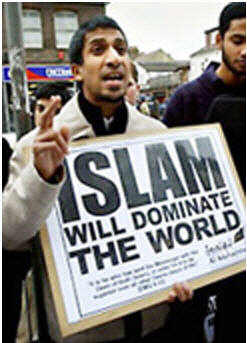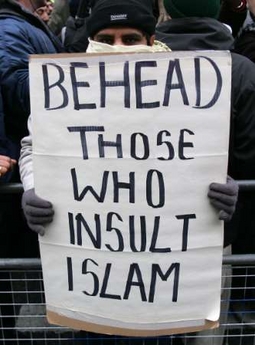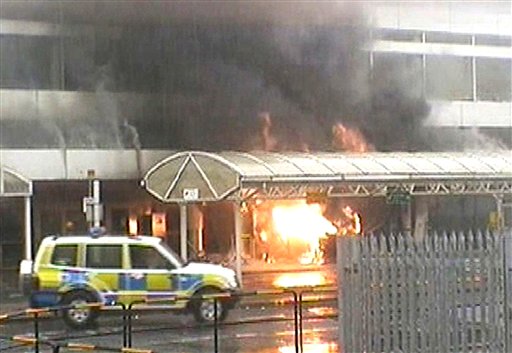The Economist Lashes Out on the Ground Zero Mosque
The Economist has run what amounts to a poorly researched hit piece criticizing opponents of the Ground Zero mosque.
This isn’t strictly a financial matter and we usually try to limit our scope to issues surrounding finance here on SFW, however, because The Economist has been such a shameful shill for Shariah Compliant Finance in the past, essentially acting as a cheerleader, running fluff pieces that read like marketing brochures and press releases, we’d thought we’d weigh in on what is truly an offensive and misleading piece:
Build that mosque
http://www.economist.com/node/16743239
If the Economist is going to ignore the myriad concerns surrounding Shariah Compliant Finance and treat monsters like Sheikh Yusuf al-Qaradawi and Mufti Taqi Usmani as if they were legitimate, benign players in the financial world, then the publication needs to be called out for faithfully and shamelessly running the Muslim Brotherhood line.
This latest broadside against the opponents of the Ground Zero mosque amounts to just that: Muslim Brotherhood propaganda.
Let’s start with the armchair, junk intelligence analysis that the piece starts out with:
“What makes a Muslim in Britain or America wake up and decide that he is no longer a Briton or American but an Islamic “soldier” fighting a holy war against the infidel? Part of it must be pull: the lure of jihadism. Part is presumably push: a feeling that he no longer belongs to the place where he lives.”
The anonymous author who penned this gem is essentially blaming the West for the violent attacks that have been inflicted by the Jihadists over the years. He is warning Americans that, if they don’t accommodate Muslims, we can expect Muslims to act like Nidal Malik Hassan and start slaughtering us. Besides being bigoted and insulting to the millions of peaceful Muslims The Economist purports to aid with its editorial screed, it’s just plain wrong.
Great Britain has tried the accommodation approach for decades, even to the point of allowing 85 Shariah law courts to operate alongside its legal system:
The British welfare system actually recognizes polygamous Muslim marriages (something that could prove ruinous to the entitlement programs which already threaten free enterprise in the West):
What has all this accommodation gotten the British?
The fact of the matter, the American people do NOT have to submit. When we are insulted and attacked, we have not just a right, but a duty to defend our liberty and way of life.
The Economist then unwittingly gets to the heart of the problem:
It was in part to preserve this feeling that George Bush repeated like a scratched gramophone record that Americans were at war with the terrorists who had attacked them on 9/11, not at war with Islam. Barack Obama has followed suit: the White House national security strategy published in May says that one way to guard against radicalisation at home is to stress that “diversity is part of our strength—not a source of division or insecurity.” This is hardly rocket science. America is plainly safer if its Muslims feel part of “us” and not, like Mohammad Sidique Khan, part of “them”. And that means reminding Americans of the difference—a real one, by the way, not one fabricated for the purposes of political correctness—between Islam, a religion with a billion adherents, and al-Qaeda, a terrorist outfit that claims to speak in Islam’s name but has absolutely no right or mandate to do so.
This was never a war against “terrorism” and, while it certainly isn’t a war against Islam either, Al Qaeda is far from the only enemy here. The doctrine that underlies the Jihadists who are waging war against America and the West is broad and far-reaching. The label “Al Qaeda” cannot account for all of it. Unfortunately, it cannot even account for a majority of the enemy we are dealing with.
We are locked in a civilizational conflict which transcends traditional warfare. It has a strong element of non-violent Jihad that is as dangerous in its own way as violent Jihadist terrorism is.
What we are confronted with, but which we are unable to come to terms with because of weak apologists such as the person who wrote The Economist editorial on the Ground Zero mosque, is a global Jihadist insurgency. This isn’t an insurgency that is just happening in Manhattan, or the UK, or even Iraq and Afghanistan. Each day we monitor reports from places as geographically divergent as the Philippines, Bangladesh, Russia, Nigeria, Paraguay, Norway, Uganda, Thailand, and, yes, the United States and the United Kingdom. The Jihadist insurgency may comprise a small minority of world Muslims, but it is global nonetheless and it is well funded and serious in its aims. Moreover, students of insurgency know that insurgencies are 20% military and 80% political.
Insurgents often have no expectation that they can win militarily, but they focus on the political aspects of their campaign. An investigation into the background and associations of Imam Feisal Abdul Rauf reveals that this is exactly what we are dealing with in Lower Manhattan.
Now, The Economist, describes Rauf as a well-meaning American cleric who has spent years trying to promote interfaith understanding.
We are left to wonder: did The Economist purposely cover up Rauf’s background and associations, or were they just sloppy and lazy in reaching their conclusion about him?
Rauf has extensive ties to the Muslim Brotherhood. The Muslim Brotherhood is the grandaddy of modern Salafi Jihadist terrorist organizations, including Al Qaeda and the Brotherhood’s acknowledged Palestinian wing, HAMAS. Formed in the 1920s, there is a popular myth in the West that the Brotherhood has sworn off violence. This misconception stems from a localized agreement limited to Egypt.
Decades ago, the Egyptian government cracked down on the Muslim Brotherhood and imprisoned many of its leaders. The Saudis intervened and embraced the Brotherhood and provided an ample funding source. Later, a deal was brokered whereby the members of the Brotherhood in Egyptian prisons were released in return for pledges not to carry out violence in Egypt. The pledge never extended outside Egypt, which is probably how famous members of the Muslim Brotherhood, such as Dr. Ayman al-Zawahiri, found their way into terrorism.
Today the Muslim Brotherhood is the political wing of the global Jihadist insurgency. An analogy to World War II might go like this:
The Muslim Brotherhood is the Nazi Party, while HAMAS and Al Qaeda are the Waffen SS.
The goals of the Muslim Brotherhood are identical to those of the violent Jihadists: the re-establishment of a supreme, dominant worldwide Caliphate ruling by Shariah law.
Now we come full circle to where Imam Rauf’s ties to the Muslim Brotherhood are so ominous. In a major section of his web site which has since been removed (but was preserved as a PDF by the intrepid Christine Brim), the Shariah agenda is front and center:
http://bigpeace.com/files/2010/08/http___174.132.114.190_arkdev__qcontent_shariah-index-project.pdf
What The Economist’s poor research and reporting have deprived its readers of is the fact that the problem isn’t just a mosque on this particular site. The problem is a mosque promoted by these particular Muslims on this particular site.
With more than a touch of cynicism and irony, The Economist matter of factly dismisses concerns about the financing of the mosque. The financing of the mosque is central to the whole controversy. Why won’t Imam Rauf talk about the financing? Why isn’t the media even mildly curious about where the $100 million to build the mosque is coming from?
It is highly likely that the financing from this mosque is coming from one of two sources, or perhaps both: foreign sources and the North American Islamic Trust (NAIT). NAIT is reported to hold title to as many as 80% of the mosques and Islamic centers in the U.S. There are three things that are especially disturbing about this:
1. NAIT is at least partially funded by Saudi Arabia (a foreign power with a dismal human rights record and significant portions of its royal family associated with jihad.
2. NAIT is a Muslim Brotherhood organization. This was stipulated to by the defense in the largest terrorism financing trial in U.S. history.
3. In that same terrorism financing trial, the United States v. the Holy Land Foundation, NAIT was named as an unindicted co-conspirator. The prosecution was successful in that case, defendants were convicted on all counts. When NAIT challenged its classification as an unindicted co-conspirator, the Justice department refused to relent and issued a spirited and strong justification.
Foreign financing for this mosque on this site has implications far beyond building a place where Muslims can go pray. There is reason to believe that this site was chosen with some other purpose in mind. Of all the places to build such a mosque, why Ground Zero? It’s not a residential area. There are no large numbers of Muslim residents in the neighborhood. If foreign powers are behind its financing, then the implications immediately become much more profound and sinister. Nevertheless, Imam Rauf remains tight-lipped on the subject of financing sources, media such as The Economist exhibit no intellectual curiosity on the subject and apologists such as New York Mayor Michael Bloomberg refuse to even consider that it might be a bad idea if the Muslim Brotherhood or a foreign Salafi power is behind the project.
Finally, and perhaps most insultingly, The Economist takes its readers for idiots when it dismisses the naming of the project “Cordoba,” as if the only connotations of the name “Cordoba” center around some paradise (pun intended) of art and harmony in the Middle Ages. Had anyone at The Economist bothered to actually study history, they would have discovered that Cordoba was conquered in an Islamic jihad centuries ago and one of the things the Muslim rulers did was to construct a mosque in place of the largest Christian church in the city. The other thing the Jihadists did was to persecute Cordoba’s Jews, over time forcing their total exile.
It is true that later during the occupation, the Muslim rulers eased their oppression, but at no time were they anything but occupiers in Cordoba.
Believe it or not, the practice of replacing churches with mosques during the great Muslim jihad is something that carries over to today. We think this is an important element that needs to be considered in evaluating the Ground Zero mosque project as well, as this short blog posting on Terror Trends Bulletin:
http://terrortrendsbulletin.wordpress.com/2010/08/14/islamic-supremecism-and-conquest/
http://terrortrendsbulletin.wordpress.com/2010/08/14/islamic-supremecism-and-conquest/ “>
Categories
Archives











